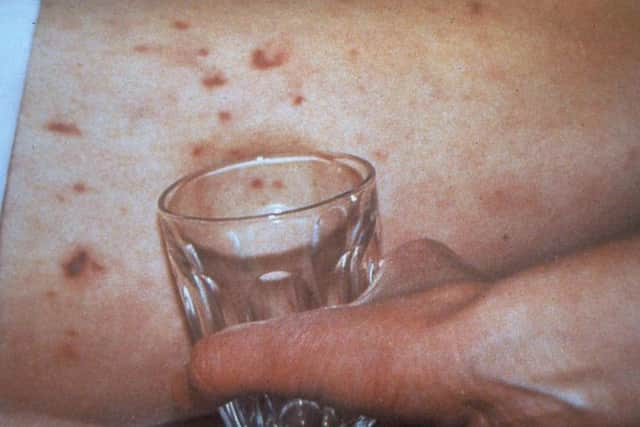What you need to know about the risk of meningitis if your child is starting university this Autumn
and live on Freeview channel 276
UK meningitis charity, Meningitis Now, is calling on mums and dads to ensure that their children have been vaccinated against Men ACWY and that they also know the signs and symptoms of the disease and what to do if they suspect it.
As thousands of students receive their A-level results and prepare for their journeys into higher education, the charity has today launched its campaign targeting parents with meningitis information and calling on them to ‘Do one last thing for your children before they go off to university – help keep them meningitis safe.’
Advertisement
Hide AdAdvertisement
Hide AdMeningitis Now says university freshers can be more vulnerable to meningitis because of cramped living conditions.


In many cases, young people come together from all over the world to live in one place and can be exposed to bacteria and viruses their bodies have not met before. This is why so many new students get ‘freshers’ flu’.
Dr Tom Nutt, chief executive of Meningitis Now, said: “Teenagers are the second most at risk group of contracting meningitis after babies and toddlers - and up to a quarter of students carry the bacteria that can cause meningitis, compared to one in ten of the general population.
“It’s vital to be up to date with vaccinations but these won’t protect your child against all types of the disease.
Advertisement
Hide AdAdvertisement
Hide Ad“Make sure they know the signs and symptoms and that fast action saves lives and improves outcomes.”
Meningitis and Septicaemia - the facts:
- Meningitis is inflammation of the membranes that surround and protect the brain and spinal cord; usually caused by bacteria or viruses.
- Some bacteria that cause meningitis also cause septicaemia (blood poisoning).
-The early signs and symptoms of meningitis and septicaemia can be similar to ‘flu and include fever, headache, nausea, vomiting, diarrhoea and muscle pain.
Advertisement
Hide AdAdvertisement
Hide Ad- More specific signs and symptoms include fever with cold hands and feet, drowsiness, confusion, pale blotchy skin, stiff neck, dislike of bright lights and a rash which doesn’t fade under pressure.
- In babies, symptoms include being floppy and unresponsive, dislike of being handled, rapid breathing, an unusual, moaning cry and a bulging fontanelle (soft spot on the top of the head).
- There are an estimated 3,200 cases of bacterial meningitis and septicaemia each year in the UK.
- Following bacterial meningitis or septicaemia, one in ten people will die and at least a third of survivors will be left with lifelong after-effects such as hearing loss, epilepsy, limb loss or learning difficulties.
Advertisement
Hide AdAdvertisement
Hide Ad- It can affect anyone, but most at risk are babies, young children and teenagers.
- Vaccines give protection against SOME types of meningitis. BUT there are not vaccines to protect against ALL types.
- If you suspect meningitis or septicaemia, trust your instincts and get immediate medical help.
- Public Health England reports that there were 747 cases of meningococcal meningitis and septicaemia in England last year, with 18 per cent of cases occurring in young adults aged 15 to 24. Of those who contract bacterial meningitis one in ten will die and one in three survivors will be left with life-changing after-effects
Advertisement
Hide AdAdvertisement
Hide Ad- First year students up to the age of 25 can obtain a free vaccination for Men ACWY from their GP, although many will already have received this whilst at school. But this does not protect them against all strains of the disease and they are unlikely to have been vaccinated against Men B, leaving them at risk from this strain of the disease.
Support for the campaign
The charity’s campaign is being supported by Bristol mother Michelle Bresnahan, who lost her 16-year-old son Ryan to Men B in 2010. Since then she has campaigned tirelessly alongside her university-student daughter Charlotte to raise awareness so that more young people can be protected, raising thousands through the Life for a Cure charity set up in Ryan’s memory.
Michelle said: “I know only too well how devastating this disease can be and have seen the worst it can do, destroying young lives and tearing apart those who remain.
“No one should be left counting the cost of inaction – I’m appealing to all parents to act now to ensure their children are safe.”
Advertisement
Hide AdAdvertisement
Hide AdMeningitis Now offers a free information pack for parents and students, including leaflets, signs and symptoms cards, fridge magnets and year planners – all of which contain lifesaving information. They are available free of charge here.
.